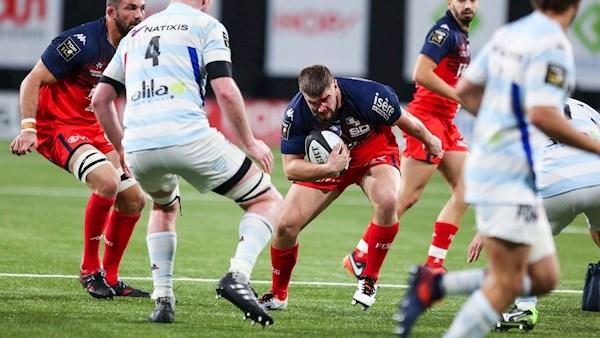Can you speak any Irish, Duncan?”
“Eh, I can yeah, a bit.”
“Can you say some stuff?”
“Eh, yeah, eh…”
And so began a few moments of awkwardly tripping over the most basic Irish phrases, with plenty of French peppered into my shamefully and incoherently poor attempt to showcase my country’s language. The conversation was with Edgar Tu’inukuafe, a very large and very friendly New Zealander of Tongan descent that I have had the pleasure of getting to know since I moved to France.
Like many Pacific Islanders in his native Auckland, Edgar’s parents moved there in search of a better life for themselves and their families. This is the case for many players of Pacific heritage who now ply their trade in Europe. While I had played alongside Casey Laulala and Francis Saili at Munster, I was largely ignorant of “Islander” culture and what it entailed.
Happily, I have had no choice but to familiarise myself given the demographics of my Grenoble team this season.
I play alongside guys who either grew up or whose parents grew up in Tonga, Samoa, Fiji, Cook Islands, and Tahiti.
In fact out of the English speaking playing group, I am the only European. That has been the most interesting and most challenging part of coming to Grenoble, and certainly the most enjoyable. It gives me a much better perspective of what it is like to be an outsider and what life is like for people on the other side of the world, where priorities and motivations are completely different.
The most eye-opening feature of it all is the attachment each one of them has to their culture.
They are proud of their heritage in a very visible way; proud of their language, their traditions, their history. One of the lads has never been to his parents’ home in Samoa but speaks the language fluently. This is commonplace. Indeed, Edgar told me that he got a clip around the ear if he was caught speaking English instead of Tongan in the family home.
Seeing this commitment to their culture has been a humbling experience for someone who, apart from a splash of Scottish blood on my mother’s side, is as Irish as Irish can be. I’ve become quite ashamed that the Irish language holds such a maligned place in society today. With the recent chatter (once again) about whether to remove its core status as a school subject, it’s not hard to imagine that Irish is going to be on the receiving end of an onslaught in the coming years.
“I love Irish culture,” I always told people. Sure I enjoyed going to trad sessions and having a few pints of Guinness. I had The Dubliners playing in the car. I usually had the bacon and cabbage at the carvery across the road from my house. When I was asked to speak a few sentences in a language I learned for 14 years however, the depth of this love was examined and it made me uncomfortable.
I was a good Irish student. I got a B2 in higher level which indicates a pretty decent grasp of things. After my conversation with Edgar, I resolved to start learning Irish again. I downloaded DuoLingo, a pretty useful language application that is ideal for casual learning, and did the test to determine my level. I “tested out” of zero skills; not a single one. Essentially DuoLingo was telling me that my Irish was about the same standard as someone in Ghana who picked up their phone one day and decided to learn it.
While I laughed, it was quite embarrassing. I think it fair enough to say that many people in the country would have similar success, which tells me something is very wrong. How can we learn a language for 14 years and barely speak a word of it a short time later?
I follow some fluent Irish speakers on Twitter for whom I have the utmost respect and admiration, including Peter Kavanagh of the Green Party and Osgur Ó Ciardha, co-founder of Pop Up Gaeltacht.
They are adamant that the way Irish is taught in schools is not a valid excuse.
My own experience leads me to disagree. I remember one particular period in fourth class of primary school. I was nine years old and learning the dreaded Modh Coinníolach (conditional tense). As someone quite rightly pointed out to me before, the conditional tense is a crucial part of communication in any language. Of course it is; but is it really that crucial for nine-year-olds? I am certain some of my classmates decided there and then that Irish was not for them, nor would it ever be.
I believe Irish should be compulsory in school, without question.
However, it must be recognised that a “compulsory” tag automatically engenders a certain amount of resentment and pushback in people.
This was my experience of maths. I hated it. I cursed the education system every day for forcing me through the torture of trying to learn things I had neither the desire nor the ability to excel at.
For some people, that is their experience of Irish. If they are like me, they probably made up their mind pretty early on that it was something to be endured, not enjoyed.
Something has to change. Interestingly, I never witnessed the same negativity in people when it came to studying French or German. In my experience, continental languages had a much greater emphasis on communication, with analysis of literature being left aside.
I’m not an expert on education. But I do know that if this issue is going to be looked at as more than an inconvenience by people with the power to address it, pressure will have to come from all walks of life, not just the passionate native speakers we hear on the radio from time to time.
There’s nothing like moving abroad to make you appreciate your home. I realise I give out about Ireland a lot but moving to France has opened my eyes to the many wonderful and unique thing we can be proud of.
Before coming here, I never considered our beautiful language to be one of them. We can drink all the stout and listen to all the Luke Kelly we want.
If we can’t speak Irish, I would argue that we don’t really love our culture as much as we think we do.

